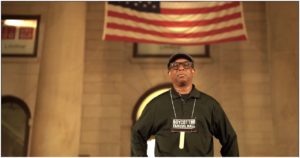It’s Veterans Day today, and it is an opportune time to reflect on how the military’s role in American society is changing for the worse. On a day when we honor those who have served and sacrificed for the country, the Trump administration’s policies toward the uniformed services threaten to undermine the competence and capacity of the armed forces and end America’s long and rightly cherished tradition of military professionalism and political neutrality.
Last week, the New York Times devoted a lengthy article to Secretary of Defense Pete Hegseth’s continuing effort to purge the upper ranks of the uniformed services. He’s not holding senior officers accountable for poor performance or removing men and women who aren’t good at their jobs; he’s firing them because they are female or Black, show signs of being independent-minded, or worst of all, because President Donald Trump has it in for them on purely personal grounds. Case in point: He’s delayed or canceled promotions for four senior officers whose sole offense seems to have been that they worked closely with retired Gen. Mark Milley, the former chair of the Joint Chiefs of Staff for whom Trump has a special animus.
It’s Veterans Day today, and it is an opportune time to reflect on how the military’s role in American society is changing for the worse. On a day when we honor those who have served and sacrificed for the country, the Trump administration’s policies toward the uniformed services threaten to undermine the competence and capacity of the armed forces and end America’s long and rightly cherished tradition of military professionalism and political neutrality.
Last week, the New York Times devoted a lengthy article to Secretary of Defense Pete Hegseth’s continuing effort to purge the upper ranks of the uniformed services. He’s not holding senior officers accountable for poor performance or removing men and women who aren’t good at their jobs; he’s firing them because they are female or Black, show signs of being independent-minded, or worst of all, because President Donald Trump has it in for them on purely personal grounds. Case in point: He’s delayed or canceled promotions for four senior officers whose sole offense seems to have been that they worked closely with retired Gen. Mark Milley, the former chair of the Joint Chiefs of Staff for whom Trump has a special animus.
If you want to know why Hegseth’s moves are so worrisome, I suggest you read two important books on civil-military relations. The first is Samuel P. Huntington’s classic The Soldier and the State, which is arguably the most influential book on this topic ever written by an American. Writing when the idea of a large and permanent peacetime military establishment was still somewhat controversial in the United States, Huntington argued that this would not be a threat to democracy provided the military was highly “professionalized,” meaning that its members understood their mission was to master the military arts but not to interfere in politics. I think Huntington downplayed the indirect and often harmful effects of the emerging “military-industrial complex”—such as threat inflation, excessive spending, and a tendency to overvalue the utility of military force—but he was correct that a thoroughly professionalized military sworn to uphold the Constitution, and whose leaders were selected and promoted primarily on the basis of their competence, was the best insurance against either a military coup or a president trying to use the armed forces to cement their own hold on power.
The second book you should read is MIT professor Caitlin Talmadge’s terrific study The Dictator’s Army: Battlefield Effectiveness in Authoritarian Regimes. Talmadge argues that authoritarian militaries tend to be terrible at fighting wars when a dictator is primarily worried about internal threats, and especially the possibility of being ousted in a coup. In states like South Vietnam or Saddam Hussein’s Iraq, this focus leads authoritarian leaders to choose and promote commanders for their loyalty rather than their competence, to focus training efforts on internal dangers rather than external foes, and to sow divisions within the military establishment and control the flow of information so as to make it more difficult for commanders to threaten the dictator’s hold on power. These practices are all detrimental to battlefield performance. By contrast, authoritarian governments that are less worried about internal enemies—such as North Vietnam—can focus on building effective military organizations and maximizing their military power. Talmadge also shows that dictators who find themselves facing a dire external danger—as Iraq did in its long war with Iran or as the Soviet Union did when Nazi Germany invaded—will be forced to abandon their dysfunctional practices to stave off defeat.
Taken together, these two books go a long way toward explaining why Hegseth’s actions (which presumably have Trump’s full approval) are so worrisome. Although I doubt that Trump and Hegseth are worried about a military coup, they are clearly worried about domestic opposition to their ambitious and arguably illegal efforts to consolidate power in the executive branch, disenfranchise millions of voters, and retain power indefinitely. Why else would Trump direct the military to focus on the “enemy within”? Gradually transforming the U.S. military into an organization that would not oppose a replay of the failed Jan. 6, 2021, attempt to overturn the 2020 election, or even into an organization that could be used to support such an action, is a potentially mortal threat to American democracy. Remember: Trump fired first-term Secretary of Defense Mark Esper because the latter had opposed Trump’s proposal to use the military against domestic protesters in June 2020, and his anger at Milley also stems in part from a similar disagreement before the assault on Capitol Hill.
If this trend continues, what are the likely consequences? First, choosing senior officers for their loyalty rather than their competence means that U.S. troops, sailors, and pilots won’t necessarily be led by the most knowledgeable, experienced, or capable commanders available. That’s not good on its face. Second, many patriotic officers will not want to serve in an increasingly politicized and unprofessional environment, and some will choose to end their careers prematurely, thereby robbing the armed services of more talented leaders and tilting the officer corps in an even more partisan direction. (This may, in fact, be what Hegseth is seeking to do.) Third, the more that the military is tasked with domestic missions—such as patrolling the streets of blue-state U.S. cities that have falsely been depicted as rife with dangerous criminals—the less ready it will be to take on a serious foe. Blowing up unarmed boats or firing cruise missiles at weak adversaries is one thing, but if you are trying to deter and, if necessary, defeat a serious peer competitor, purging some of your best commanders and diverting the institution toward unnecessary domestic missions is the epitome of a self-inflicted wound.
But hold on a second. Doesn’t America’s recent track record in battle suggest that a shakeup of the top brass is long overdue? Although U.S. leaders like to boast about having the strongest military in the world, that well-funded force suffered embarrassing defeats in Iraq and Afghanistan and several other embarrassing setbacks and incidents in recent years. Hegseth may be a posturing, poorly prepared prima donna, but maybe letting a few heads roll will inspire the others.
If only. If Hegseth was purging the ranks by removing commanders who were demonstrably corrupt or incompetent—as George Marshall did in World War II—and carefully laying out the case for these decisions, then one might see it as a wholly desirable form of accountability. But that is manifestly not what is happening. Instead, officers are being relieved and promotions being denied for no apparent reason, or because they don’t happen to fit Trump and Hegseth’s image for what military officers should look like or believe.
Moreover, the recent failures of the American military occurred primarily because it was given nearly impossible missions by the country’s civilian leaders, most notably in those fruitless “nation-building” efforts in Iraq and Afghanistan and the equally ill-advised efforts at regime change in Libya or Somalia. The U.S. military has been extremely good at deterring aggression in key areas, and as it proved in the first Gulf War, it can also be extraordinarily effective at defeating weaker armies and reversing conventional aggression. What it is not good at is occupying and transforming poor, multiethnic countries with no prior history of such democratic governance, but no military has ever been good at that task. Some former U.S. military leaders can be faulted for failing to warn their civilian counterparts that they were being sent on a fool’s errand, or for delivering upbeat assessments of progress that they knew were not true, but Hegseth’s machinations won’t solve either of these problems, and there is no evidence that the generals and admirals he has been purging were not good at their jobs.
So this Veterans Day, I invite you to reflect on the vital role(s) that the U.S. military plays in American society and the need to insulate it as much as possible from partisan politics and the current administration’s efforts to consolidate power. It will be a tragedy not easily reversed if this Veterans Day is the last one where Americans have a military of which they can be deservedly proud, and one that does not pose a threat to their freedoms here at home.






